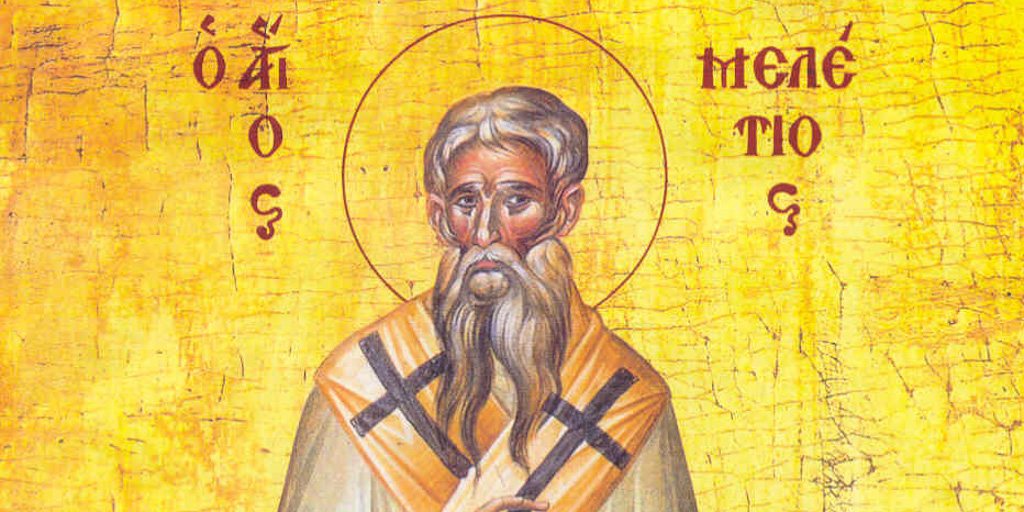Memory of Saint Meletius, Archbishop of Antioch (12 February)


The Church commemorates Saint Meletius of Antioch, Archbishop of Antioch, Saint Antony II, Patriarch of Constantinople, Holy martyrs Plotinus and Saturninus, and New Martyr Christos the Gardener.
Saint Meletius was born in AD 310 in Melitine in Lesser Armenia. Saint Meletius was a very educated, pious and virtuous Christian. In AD 357, he was ordained Bishop of Sebaste and three years later he was elected Archbishop of Antioch.
His devoutness, morality, and spiritual virtues immediately made him especially beloved in the church community. For this reason, when he arrived in Antioch, all the faithful gathered on the streets to welcome him and receive his blessing. However, Saint Meletius was deposed from his cathedra after thirty days, because the intrigues of Arians persuaded Emperor Constantius to exile him to Armenia. However, God’s righteousness triumphed.
When Emperor Theodosius the Great convened the Second Council of Constantinople in AD 381, Saint Meletius was invited to take part and preside over it.
Unfortunately, he fell asleep soon after the opening of the Council. His funeral was attended by all the Fathers present, as well as many believers, as a token of honor and recognition of Saint Meletius. Saint Gregory the Theologian was selected to preside over the Council, who after pressure resigned from the presidency of the Synod and from the Throne of the See of Constantinople. The Second Council of Constantinople completed its work under the chairmanship of Archbishop Nektarios of Constantinople.
This holy Father, who was from Melitene of Armenia, was a blameless man, just, reverent, sincere, and most gentle. Consecrated Bishop of Sebastia in 357, he was later banished from his throne and departed for Beroea of Syria (this is the present-day Aleppo). After the Arian bishop of Antioch had been deposed, the Orthodox and the Arians each strove to have a man of like mind with themselves become the next Bishop of Antioch. Meletius was highly esteemed by all, and since the Arians believed him to share their own opinion, they had him raised to the throne of Antioch. As soon as he had taken the helm of the Church of Antioch, however, he began preaching the Son’s consubstantiality with the Father. At this, the archdeacon, an Arian, put his hand over the bishop’s mouth; Meletius then extended three fingers towards the people, closed them, and extended one only, showing by signs the equality and unity of the Trinity. The embarrassed archdeacon then seized his hand, but released his mouth, and Meletius spoke out even more forcibly in defense of the Council of Nicaea. Shortly after, he was banished by the Arian Emperor Constantius, son of Saint Constantine the Great. After the passage of time, he was recalled to his throne, but was banished again the third time by Valens. It was Saint Meletius who ordained Saint John Chrysostom reader and deacon in Antioch (see Nov. 13). He lived until the Second Ecumenical Council in 381 (which was convoked against Macedonius, Patriarch of Constantinople, the enemy of the Holy Spirit), over which he presided, being held in great honor as a zealot of the Faith and a venerable elder hierarch.
Some time before, when the Emperor Gratian had made the Spanish General Theodosius commander-in-chief of his armies in the war against the barbarians, Theodosius had a dream in which he saw Meletius, whom he had never met, putting upon him the imperial robe and crown. Because of Theodosius’s victories, Gratian made him Emperor of the East in Valens’ stead in 379. When, as Emperor, Saint Theodosius the Great convoked the Second Ecumenical Council in Constantinople two years later, he forbade that anyone should tell him who Meletius was; and as soon as he saw him, he recognized him, ran to him with joy, embraced him before all the other bishops, and told him of his dream.
While at the Council, Saint Meletius fell ill and reposed a short while after. Saint Gregory of Nyssa, among others, gave a moving oration at his funeral; bewailing the loss of him whom all loved as a father, he said, “Where is that sweet serenity of his eyes? Where that bright smile upon his lips? Where that kind right hand, with fingers outstretched to accompany the benediction of the mouth?” (PG 46:8-6). And he lamented, “Our Elias has been caught up, and no Elisseus is left behind in his place.” (ibid., 860). The holy relics of Saint Meletius were returned to Antioch and were buried beside Saint Babylas the Martyr (see Sept. 4), in the Church dedicated to the Martyr which Meletius, in his zeal for the Martyr’s glory, had helped build with his own hands.
Apolytikion of Meletius, Abp. Of Antioch
Fourth Tone
A model of faith and the image of gentleness, the example of your life has shown you forth to your sheep-fold to be a master of temperance. You obtained thus through being lowly, gifts from on high, and riches through poverty. Meletios, our father and priest of priests, intercede with Christ our God that He may save our souls.
Source: Church of Cyprus / goarch.org




